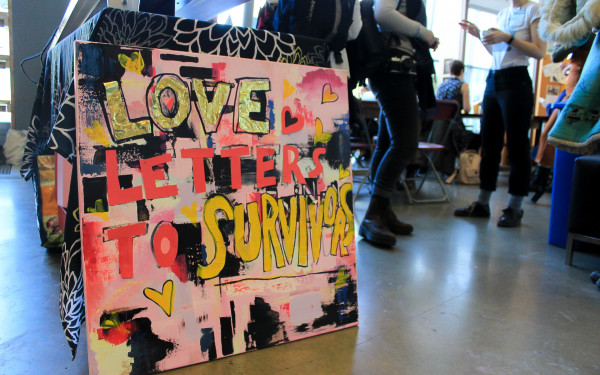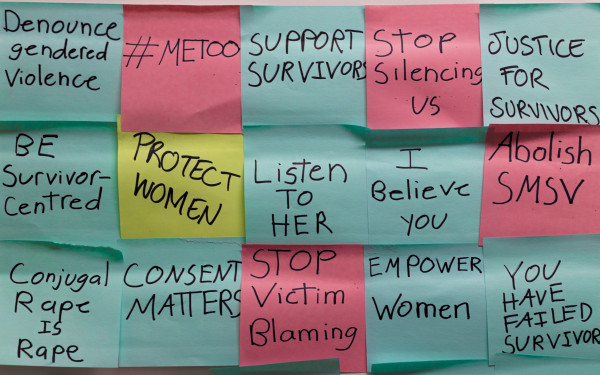Making Better Support for Survivors a Matter of Policy
Concordia Prepares Internal Review of Its Sexual Assault Policy
Nowhere in Concordia’s current policy on harassment, sexual harassment and psychological harassment does it use or define the term “sexual assault.”
“Some survivors are unsure if they can make a complaint or go forward because they’re not sure if their experience fits in or ‘counts’ when it clearly does, and they clearly experienced sexual violence,” said Jennifer Drummond, the coordinator of Concordia’s Sexual Assault Resource Centre.
She adds that victims might not know sexual assault can fall under the sexual harassment section or the violent and dangerous section of the code.
A new committee of administrative staff, faculty and students is conducting an internal review into Concordia’s sexual harassment policy and recommendations for changes that may be ready this semester, according to Concordia president Alan Shepard.
The committee is chaired by Deputy Provost Lisa Ostiguy and includes her executive assistant Angela Ghadban, Dean of Students Andrew Woodall, Melodie Sullivan of the Office of the General Counsel, associate professor from Applied Human Sciences Hilary Rose, and undergraduate students Ian Walker and Jessica Lelievre.
Ostiguy says that she formed the team to have a variety of expertise and different views of how the campuses operate. She adds that the committee’s goal is not to create a new policy but to offer recommendations, although a complete overhaul is possible.
“[Our] role is really to consult various groups across campus with different expertise than what we have on the committee,” she said.
Woodall recommended the recruitment of Lelievre and Walker. He says they are representative of the student body and are “smart people” who were referred to him by other students.
The formation of the committee is an effort by Shepard to avoid potential scandals faced by other North American universities in recent years, according to Ostiguy.
“We’ve been looking at a variety of universities that have recently updated their new policy and seeing the recommendations they have and comparing them to ours,” she said.
Finding Inspiration
Colleges Ontario, an advocacy group representing postsecondary schools in the province, made national headlines last month when it released a 14-page template outlining how sexual assault victims should proceed formally and legally following an attack, to be implemented in March.
Approved by the Committee of Presidents of the province’s 24 publicly-funded colleges, it outlines terminology like sexual assault, sexual violence and consent, and explains who and where to go for help. It also states supportive responders to victims must listen without judgment and accept that the disclosure is true.
Karen Horsman, the manager of communications at Colleges Ontario, says that the development of a new protocol came in response to a lack of a uniform provincial policy where victims felt they were being served.
She says the focus was always to create a welcoming environment where survivors are heard. “There’s nothing more powerful than saying, ‘We hear you, now how do we get help, how do we proceed?’ Horsman said. “That immediacy is what legitimizes the whole process.”
Shepard says he is in touch with representatives from Colleges Ontario. “It is important that the Ontario colleges recognize that if someone has experienced sexual assault, it will not take a PhD to find on the website where to go, what to do next and how to help,” he said.
Problems within the System
Drummond is the only full-time staff member at SARC, but she has a team of undergraduate volunteers and the staff at the counselling and development office to work with. The centre is a two-office setup on the downtown GM building’s third floor, to the left of a narrow corridor.
A piece of scrap paper with the words, “Sexual Assault Resource Centre” written on it, along with a directive arrow, is posted to a corkboard adjacent to the elevator.
Drummond says her office’s location has pros and cons.
“On one hand, it does provide a fairly anonymous type of situation which can be really good for people,” she said. “They’re walking into a big building, taking an elevator, walking down a maze of corridors to get here, so they’re protected in that way.
“On the down side, it makes it harder for people to know that we exist.”
SARC doesn’t have an account on any social media platform. There isn’t a link to its online resources on the Concordia homepage. Typing “sexual assault” in the search bar causes SARC’s page to appear first in results. It takes two or three more clicks to reach PDF versions of flyers explaining assault, consent and a list of contacts.
Ostiguy says that this visibility issue may be addressed as SARC is going to work more closely with the Dean of Students office. The new relationship may lead to procurement of new space and additional staff for front deskwork, she adds.
Drummond says adding more staff may be difficult for the university due to the financial climate. She adds that SARC would “definitely benefit” from more employees as much as any other organization in the university.
“We would be able to do more and help more people and reach more people with our educational initiatives if there were more staff,” she said.
Shepard says Drummond developed the model of working with undergraduate volunteers and that they have a good relationship with her. “From what I understand that’s working very well,” he said.
Education is Key
At a Board of Governors meeting this month, Louise Shiller, the director and senior advisor of the Office of Rights and Responsibility, said in a 2013-2014 report that they dealt with 11 cases of sexual harassment, four of which involved sexual assault. Three of those were formal complaints and one included threatening or violent conduct.
She said that her office works closely with SARC and that they occasionally sit down together with a victim to discuss the best options. However, she continued that her office is a “very specific” place and “not for everybody” as victims are referred to both resource centres or sometimes go directly to security.
Drummond says she is impressed with what Colleges Ontario has created with clear instructions and statements, like making sure the victim feels their story is believed, and the use of gender-neutral diction.
“It just doesn’t happen; people don’t make that up,” she said of allegedly false sexual assault allegations. “More education needs to be done around believing survivors and encouraging people to come forward.”
Drummond says she is developing training for athletes and coaches about sexual assault education and is currently working with the campus residences and RAs.

_900_611_90.jpg)
_600_832_s.png)

_600_375_90_s_c1.JPG)


